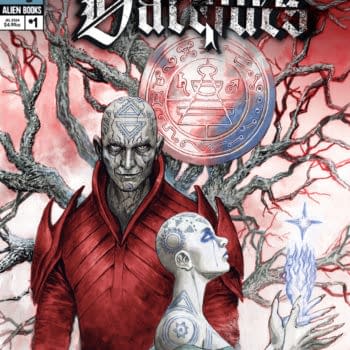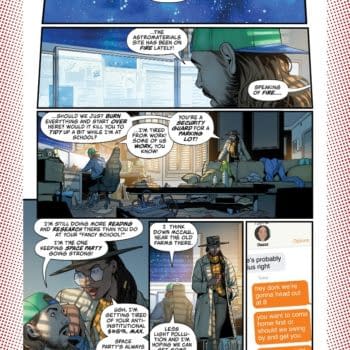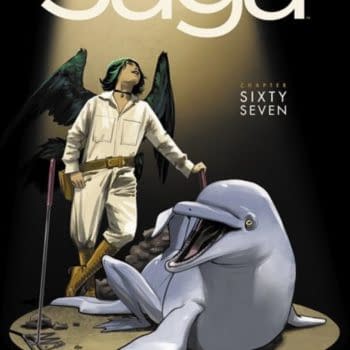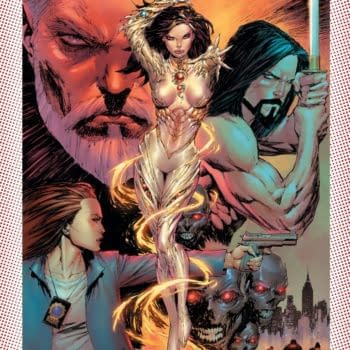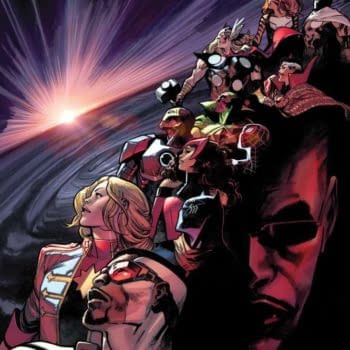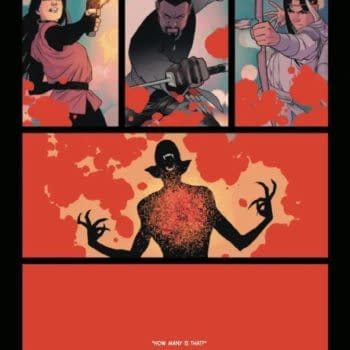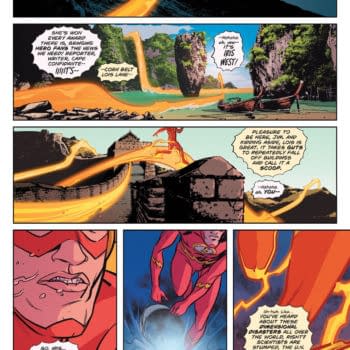Posted in: Comics, san diego comic con | Tagged: an diego, comic con, Comics, entertainment, eric stephenson, image expo, san diego comic con, sdcc
Image Comics Publisher Eric Stephenson's Keynote Speech To Image Expo
Here is Eric Stephenson's keynote address to Image Expo, yesterday, held before San Diego Comic Con. As ever, we look forward to hearing more from Eric at Bleeding Cool very soon…
"The only rules are the ones we create." – Warren Ellis
Every time I start writing one of these presentations, I share my initial draft with various folks around the office, and invariably, someone says that it's always a good idea to start a speech with a joke.
So here's one:
A week ago, I woke up to learn that the comics industry was storming into San Diego with more announcements about licensed comics based on old movie and TV franchises, gender-bending superheroes, crossover events that previously would have been relegated to the realm of fan fiction, and the brutal murder of a beloved children's character.
I texted a friend with some of this news, and his response was, "Eric, it's not even 10 am. Are you drunk?"
The punch line to that joke is I wish I had been.
It's hard to believe that as far as comics have come since the turn of the century, with the tremendous impact comics have had on the cultural landscape, and all the hard-fought success we've achieved as a medium that is finally beginning to be taken seriously, this is still what passes for "new" to the overwhelming majority of the comic book industry.
Grave robbing the past in an attempt to pump new life into decades-old characters.
Treating gender equality and cultural issues as though they're little more than gimmicks to increase sales.
That's the comic book industry of the past, ladies and gentleman, and this year, it's clinging on for dear life.
We've invited you here today, though, to talk about the future.
I had the opportunity to speak to a group of students recently, as a part of the California College of the Arts' "Comics in the City" series, and I have to say, it's was an exhilarating experience.
Not because I like talking about myself or being in front of an audience – I think you can tell just by looking at me, that couldn't be any further from the truth – but because the audience itself was made up of young men and women enrolled in CCA's MFA in Comics program, and looking out at that audience, and the diversity it represented, filled me with hope.
Hope is important in comics, and it's important to the future of comics.
I know that because every time I see or hear a new idea, every time I approve a new series for publication at Image, I hope that it's going to make a difference in a marketplace that is overrun by literally hundreds of comics designed to do exactly the same thing comics have been doing for decades.
It's that hope that lead me to work in comics to begin with, because as a student of comics history, I knew that the way Stan Lee, Jack Kirby, and Steve Ditko revived comics' flagging fortunes in the early 1960s was not by simply churning out the same ol', same ol' month-in and month-out, but by changing the rules and making the kind of comics they wanted to make, by doing things their way.
Before that, way back at what was more or less the midway point in the 20th century, conventional wisdom was that comics were more or less doomed. There was a popular new device that everyone was raving about – the television! – and sales of monthly comics were steadily declining from their high point in the glory days of the 1940s.
Comics seemed like a relic of the past, but thanks to only a handful of men's creativity and perseverance, this dying industry was given a new lease on life.
A future.
That was 50-odd years ago, but if not for the hope those writers and artists of yesteryear had, that they could somehow make a difference by doing something different and new, we wouldn't be celebrating comics here this week at what has, in recent years, become a huge cultural event.
And without the hope of those men and women I spoke to at CCA, without the ambition of all the men and women just like them over the world, who not only want to work in comics, but want to write and draw their own comics, their own way, there won't be a tomorrow.
You see, you have to fight for the future.
One of the questions I was asked at the CCA, a question that comes up more and more often, was how we create more diversity in comics.
For decades, the comics industry has been viewed as a boys club, but that's changing.
The reason that's changing is because now, more than ever, there are comics that actually appeal to a readership beyond the audience our industry has spent so much time servicing since comics' resurgence in the 1960s.
An industry status quo was set back then that ensured comics were primarily read by young, white men, and that resulted in a talent pool that consisted, by and large, of young, white men.
If we want to build a more diverse industry, though, if we want to develop a more diverse talent pool, then it is of utmost importance that we produce comics that appeal to as wide an audience as possible, because people who aren't reading comics are not going to suddenly decide they want to work in this business.
The men and women working in comics today are only doing so because they grew up loving this medium, and because they desperately wanted to be a part of it.
We can't go back in time and change the readership of comics in the past, but we can demand a better future by changing now.
Change is absolutely integral to our future.
Just doing things as they've always been done, or accepting things as they are is not how you move forward.
That's how you stand still.
Standing still didn't work for comics in the 1960s, and it isn't going to work for comics now.
Over the course of 2014, Diamond has reported again and again that sales are down from last year. At the midpoint in the year, dollars are down, and units are down – and down is not the direction we want to be going.
Down is the direction you go, however, when you stand still for too long, because after a while, the ground begins to erode beneath your feet, and ever so slowly, you start to sink.
That's why, here at Image Comics, we have an ongoing policy based on two simple words:
Move forward.
If I can pull up a chart real quick, I'd like to show you how that's working out for us.
I've talked in the past about the success we've had over the past few years and the fact that our annual sales, both in terms of dollars and units, have been increasing on an annual basis since 2009, but today, I'd like to highlight something that stands in fairly stark contrast with current industry-wide numbers, because as you can see, we are having a great year – our best year in over a decade.
Image Comics' sales are up on a month-to-month basis when compared to 2013, and again, this isn't the first year we've enjoyed this kind of growth.
And similarly, when I tell you today that growth is directly linked to our utter refusal to stand still, it won't be the first time, either.
It's not that I like repeating myself, incidentally, it's just that, despite our phenomenal success these past few years, the burden of proof remains on me to explain something should be readily apparent by now.
Maybe it's time we tried a different approach…
[youtube]https://www.youtube.com/watch?v=FYxF1BkXYUE[/youtube]
Earlier in the year, I spoke to a group of retailers at an annual gathering hosted by an organization called ComicsPRO.
As often happens when I speak, I ruffled a few feathers.
I can't imagine I'm making many friends here today, either, at least not amongst our competitors.
People busy upholding the old ways are never interested in hearing what they're doing wrong, even if it's said with the best intentions.
I say the things I say, and do the things I do, make the decisions I make, because I think the future of comics is worth fighting for.
No matter what anyone else says or how offended anyone else gets, I will not back down from my position that comic books are more than mere marketing materials for movies, toys, and video games.
Does that mean there aren't good comics based on movies, toys, and video games?
Of course not: The writers and artists who make this industry as wonderful as it is are too talented for me to stand here and suggest they aren't capable of putting out the absolute best licensed comics possible.
But no matter how good those comics may be, no matter how great they may be, that's not the future.
Our competition, recognizing how successful we've become and how we continue to thrive, is starting to take a renewed interest in creator-owned comics, though.
I applaud the effort, as I would anything that shines a brighter light on the men and women who make comics, but all too often, the comics they're publishing are so blatantly not creator-owned, the best they can do is call them "creator-driven."
There's one for you:
"Creator-driven."
It's patently absurd that anyone would even attempt to champion that term, the definition of the bare minimum requirement for the creation of good comics.
I don't recall who coined that term exactly, but it was while I was on a panel at that same ComicsPRO meeting earlier this year, with representatives from our four closest competitors.
Somebody – I forget whom exactly – said that creator-owned comics don't matter to the comics buying public, and someone else on the panel chimed in that the important thing is that comics are "creator-driven," prompting everyone else to agree.
Maybe "creator-owned" is not a particularly sexy term when it comes to selling or marketing comics, because ultimately, what readers want most of all is to be engaged, excited, and entertained by the books they're reading.
"Creator-driven."
Again, that's the past speaking, as it hangs on by a thread.
The mistake my colleagues continue to make, what they fail to understand, is that "creator-owned" does matter to the men and women writing and drawing comics, because they want a better future.
The difference between "creator-driven" and "creator-owned" is that the one of those terms is doublespeak for an industry standard that should have been up for review long ago, whereas the other describes something that is real and worth fighting for.
From Jerry Siegel & Joe Schuster to Jack Kirby to Alan Moore, from Brandon Graham to Brian K. Vaughan to Kelly Sue DeConnick, comic book creators actually do know the difference between getting a good deal and getting the shit end of the stick.
That's why Image Comics will continue to produce the best comics, by the best creators, without cutting ourselves in for the lion's share of their profits or so much as even 1% of their rights.
And that's why Image Comics will continue to grow.
People scoffed when I said our goal is to be the number one publisher, but consider this:
The year I took over as publisher, our annual market share was down around 3%.
Last year, it was 8%
At the six-month mark this year, we are hot on the heels of 10.
And that's not because the books we publish are "creator-driven," it's because they are creator-OWNED.
You really think creator-owned comics don't matter?
The men and women working in this industry, and the men and women who aspire to work in this business, are telling you differently:
Creator-owned comics are the future.








